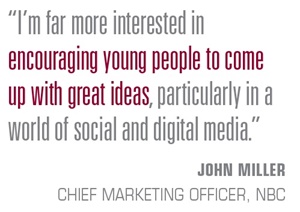“Do a million little things right” and a “Double-no rule.”
Those were some of the early leadership lessons that NBC Chief Marketing Officer
John Miller shared with me as we sat at the network’s Stamford, Conn., studios recently and discussed his years in the business. Miller has a matter-of-fact, smart style, and is now responsible for marketing all of the network’s sports programming in addition to other NBC offerings.
He’s been in the media business since graduating from Syracuse and starting as a freelance producer in 1972. He joined NBC in 1982 and has held a number of positions over the years in the promotion, advertising and now marketing sides of the business. He was part of the group that coined “Must See TV,” the pop culture slogan for the network’s successful prime-time programming in the 1980s and ’90s, especially its Thursday night schedule.
“‘Cosby’ was one of the shows closest to me,” he said, “because it was the first that I had a role in marketing. ‘ER’ is special because I saw the pilot and said, ‘That’s a hit.’ Even I could see that one being successful.”
Sitting in director chairs, with the NBC Sports logo as a backdrop, we discussed some of his early leadership lessons and why he manages down more than up these days.
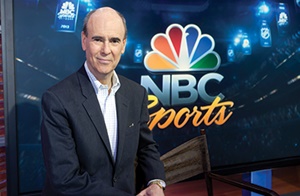 |
| Photos by: GENE BOYARS |
“There was a guy that I worked for early in my career at NBC by the name of
Steve Sohmer,” he said. “He was big in television marketing in the late ’70s and early ’80s and was sort of a Renaissance man. He went off to become a doctor in Shakespearean studies and later became chairman of Columbia Pictures. He said a couple things that were always very important to me. One of them was, ‘Do a million little things right.’ So the idea was based on this incredible attention to detail and that you win by doing a million little
things right. Yes, you focus on the big things, but you have to make sure that you are doing a lot of little things right. That’s one of the things I learned from him.
“The other thing I learned from him is something I continue to use in any management situation. It was what he called the ‘Double-no rule.’ I’ve used this with people that I’ve managed and people who managed me over the years. When someone comes to you and says, ‘Hey, I’d like to try and do this. What do you think?’ And you say, ‘No, I’m sorry. I don’t think that’s going to work.’ And they come back to you and say, ‘Wait a second. Have you thought about this? I think we can try to do this.’ Sometimes you say, ‘Hmm … OK. Give it a shot.’ That’s fine and good. But, on the other hand, if they come back a second time and you say, ‘You know, I hear your point, but I really don’t think that’s going to work.’ Then, no. That’s it. Double-no. After you’ve said ‘No’ twice, walk away. If you walk away from a single ‘No,’ you may be undermining a great idea, so push it. But double-no? You move on.”
I asked him to elaborate. He said he had pushed people on this concept throughout his career. “Most people stopped at a single ‘No,’” he said. “They were a little bit too afraid of authority and they were a little bit too afraid of their own confidence. But then there are certain people that simply just never hear the word ‘No.’ They push, and then it’s fine to say, ‘OK, now you’re annoying me.’ I go by the double-no rule still. Occasionally, will I sometimes use a single no? Sure. Will I sometimes go to a triple? Sure, if I really believe in it. But I find the double-no is the best approach. It shows that you have a real confidence in your idea but also that you are respecting someone else’s time and decision-making.”
What about his management style?
“I try to be as collaborative as I can,” he said. “I try to be as constructive as I can. I try to be as kind as I can. I like to try to get people comfortable around me. At a certain point, you realize that you’ve moved up a little in the food chain and you can be a little intimidating. I try to be as non-intimidating as I possibly can because good ideas can come from everywhere. But I’m also very competitive. I try to instill a winning culture without being overly competitive. I also try to communicate as much as I can. I try to be as open as I possibly can and overcommunicate to make sure that people feel involved in the process.
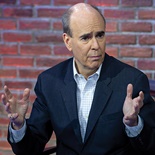 |
|
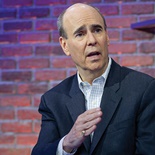 |
|
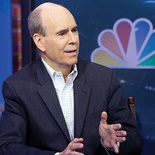 |
|
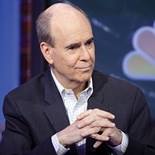 |
Miller said his management style is collaborative, and competitive. “I try to instill a winning culture without being overly competitive.”
|
“I don’t think it’s in my nature to be dictatorial,” he said. “I have gotten mad and I have sworn at people, yes. But it takes a long push for me to get that way. I usually get upset when I find there’s a level of, at least in my perception, stupidity involved. Or, blindly going down a road without necessarily looking at other alternatives. As long as you come at it straight, fair and honestly, and with a creative vent, I am more than willing to go along for the ride.”
With big personalities as his bosses through the years and a mix of veterans and ambitious young people working for him, what is he better at: managing up or managing down? And, what does he spend more time on?
“I spend more of my time managing down,” he said after thinking for a moment. “Maybe it’s my age. Maybe it’s the amount of time that I’ve been in the job. I respect bosses, but I don’t feel I need to butter them up, and I try to use the same double-no rule with them. But at my age and my job, I’m far more interested in encouraging young people to come up with great ideas, particularly in a world of social and digital media. People who are 20, 30, 40 years my junior are far more expert at that area than I am. If I think I have all the answers, I’m dead. Quite honestly, the younger on that score, the better. If I can empower them, mold them, help them and make them feel part of the process, the group is better off, and so am I.”
With the short shelf life of brand CMOs, Miller has shown remarkable longevity as a network marketer, but he says it’s due to the changing demands of the role. “The competition was different. The way we marketed was different. The technology was different. It has changed dramatically. You have to continually be a student of the business,” he said. “You have to admit that you don’t know everything, because you don’t know everything. It’s changing all the time, and so you have to be an agent of change, an ambassador of change, as well as a continual student of the industry. So I try to be as creative as I possibly can. Be mindful of the fact that you’re not going to do anything that is going to get you sued and you’re not going to do anything that is necessarily going to turn people off. But you know, if we come close to getting sued and turning people off without going over, OK. I’ve never gone quite that far. I had to have my hand slapped a few times, but that comes with the territory.”
And when I asked him how he gets away from the day-to-day grind, I get a response I wasn’t expecting, one rooted in a childhood love. “I’m not sure if I ever quite get away from it, but the one thing I do enjoy is that I sang with two different international champion barbershop quartets,” he said. “I have been doing that for a long period of time, and two of my sons are involved in it as well. So if I really ever get depressed, I put on some barbershop quartet music, and that has a great way of helping me escape to some other area that puts a smile on my face. I know it is unique, and a little bit bizarre, but for some reason I’ve been a fan of barbershop harmony since I was a kid — from my first quartet when I was in the fifth grade to when I won in the Illinois district championship at 17. And I haven’t stopped since.”
Abraham D. Madkour can be reached at amadkour@sportsbusinessjournal.com.




